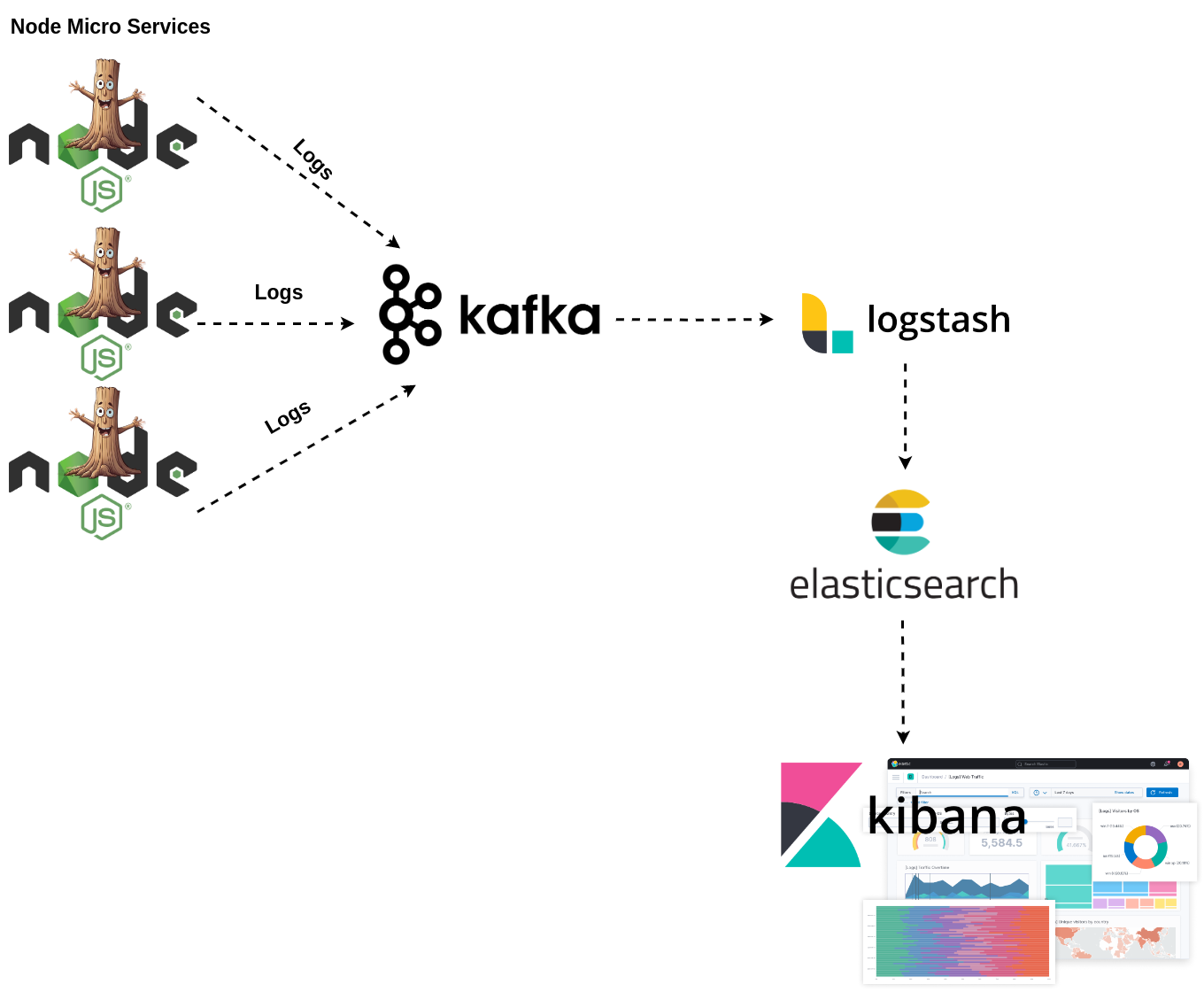LoggMe is a Fool-proof json logging utility for Node.js with colored output, file logging and Kafka broker support.
npm install loggme- Fool-proof simple configuration.
- Stdout stream, file-logging, Kafka Broker logging support.
- Easy-to-follow Centralized Log Support For Node Microservices.
In a very basic setup, import the logging library, and call the debug method.
const loggMe = require('loggme');
loggMe.debug('Hi. You just logged this message in debug level.')Output
DEBUG
{"level":"DEBUG","msg":"Hi. You just logged this message in debug level.","time":"2024-09-04T21:55:47.310Z"}When no configuration is made, the default ones are used.
- logLevel = 'DEBUG'
- timeFormat = 'IsoString'
- logFormat = 'formatters.dev'
- stream = createConsoleStream()
const loggMe = require('loggme');
/**
* Log only string
*
* syntax;
* loggMe.<debug|info|warn|error|fatal>(string_Message)
*/
loggMe.debug('Log this debug message.')
/**
* Log json fields with message
*
* syntax;
* loggMe.<debug|info|warn|error|fatal>({jsonObj}, string_Message)
*/
loggMe.debug({field1:"value1"},'Log this debug message.')
/**
* Log errors
*
* syntax;
* loggMe.<debug|info|warn|error|fatal>(error_Object)
*/
loggMe.debug(new Error("Something unexpected happened."))To experiment all possible variations see examples/1_no_configuration.js.
In production, only log selected logLevel and above.
Example;
If logLevel is set to ERROR in production, only loggMe.error and loggMe.fatal commands work.
Debug,info and warn can still be used, but does no operation.
Possible Log levels;
- ['DEBUG', 'INFO', 'WARN', 'ERROR', 'FATAL']
Operational levels after logLevel set to error;
- ['
DEBUG', 'INFO', 'WARN', 'ERROR', 'FATAL']
const loggMe = require('loggme');
loggMe.setLogLevel('ERROR');
loggMe.debug({field1:"value1"},'Log this debug message.') // no operation (DEBUG index < ERROR index)
loggMe.fatal({field1:"value1"},'Log this fatal message.') // logged in console (FATAL index = ERROR index)To experiment all possible variations see examples/2_set_logLevel.js.
Possible Log Formats
- ['dev', 'json']
By default dev logFormat is applied. Provides a colorful console output having a logLevel prefix.
To use File-Stream of Kafka-Stream set logFormat to json.
const loggMe = require('loggme');
loggMe.setLogFormat('json') // Option 1
loggMe.debug('Log this debug message.')To experiment all possible variations see examples/3_setLogLevel.js.
By default IsoString time format is applied.
Possible Time Formats
- ['IsoString', 'unixTimestamp']
const loggMe = require('loggme');
/**
* set timeFormat to isoString
*/
loggMe.setTimeFormat(("IsoString"))
loggMe.debug('Log this debug message.')
// Output: {.... , "time":"2024-09-04T14:10:42.277Z"}
/**
* set timeFormat to unixTimestamp
*/
loggMe.setTimeFormat(("unixTimestamp"))
loggMe.info('Log this info message.')
// Output: {....., "time":1725459042277}To experiment all possible variations see examples/4_set_time_format.js.
Give the path of the file as an argument to createFileStream.
const loggMe = require('loggme');
/**
* Create a json logging stream to a file.
* Colorful dev format does not look good on a file.
*/
loggMe.createFileStream('./logs.txt')
.setLogFormat('json')
loggMe.info('Log this info message.')
loggMe.fatal(new Error("Something unexpected happened."))To experiment all possible variations see examples/5_create_file_stream.js.
Although loggMe uses kafkajs library for Kafka Streaming this decision is based primarily on the fact that as of now, Node.js does not have an official Kafka client library. Confluent team's KafkaClient is still in early access development release stage. As soon as it is ready confluent-kafka-javascript will be used for later versions of the loggMe.
Define broker addresses in an array, broker-topic and optionally the clientid. Then set logFormat to json as below.
const loggMe = require('loggme');
// create a kafka stream
loggMe.createKafkaStream(['localhost:9092'], 'your-kafka-topic', "clientid")
.setLogFormat('json')
loggMe.debug('Log this debug message.')To experiment all possible variations see examples/6_create_kafka_stream.js.
In a microservices architecture it is advised to aggregate the logs from microservices and store than in a single location. Since LoggMe supports Kafka logging, you can produce all your microservice logs to kafka and collect these logs in your centralized ELK. This way you can monitor all your node microservices in a centralized manner.

